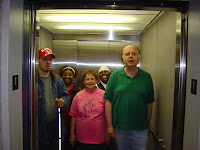You must have realised by now that many English words that look/sound like Portuguese DO NOT mean the same in Portuguese.
A simple example is ACTUALLY, which may remind you of "ATUALMENTE" but means "NA VERDADE", as in :
Eg: He is actually a doctor, not a lawyer.
Check out the false cognates below. Do you know what they mean in Portuguese?
1- Apparel
2- Comprehensive
3- Compromise
4- Deception
5- Discussion
6- Disgrace
7- Editor
8- Education
9- Eventually
10- Exquisite
Find out under: False cognates: Translations
Thursday 25 June 2009
FALSE COGNATES: TRANSLATIONS
1- APPAREL - VESTUÁRIO, TRAJE;
2- COMPREHENSIVE - AMPLO, ABRANGENTE;
3- COMPROMISE - CONCESSÃO, CONCILIAÇÃO:
4- DECEPTION - ENGANO, LOGRO, ILUSÃO;
5- DISCUSSION - CONVERSA, DEBATE;
6- DISGRACE - VERGONHA, HUMILHAÇÃO;
7- EDITOR - REDATOR ("EDITOR" IS PUBLISHER)
8- EDUCATION - INSTRUÇÃO ACADÊMICA (NOT "BOAS MANEIRAS")
9- EVENTUALLY - FINALMENTE;
10 -EXQUISITE - REFINADO, DELICADO, FINO;
2- COMPREHENSIVE - AMPLO, ABRANGENTE;
3- COMPROMISE - CONCESSÃO, CONCILIAÇÃO:
4- DECEPTION - ENGANO, LOGRO, ILUSÃO;
5- DISCUSSION - CONVERSA, DEBATE;
6- DISGRACE - VERGONHA, HUMILHAÇÃO;
7- EDITOR - REDATOR ("EDITOR" IS PUBLISHER)
8- EDUCATION - INSTRUÇÃO ACADÊMICA (NOT "BOAS MANEIRAS")
9- EVENTUALLY - FINALMENTE;
10 -EXQUISITE - REFINADO, DELICADO, FINO;
Wednesday 24 June 2009
Have you heard of these compound nouns?
OFF-COLOUR
Eg: He's feeling a bit off-colour today.
A TURN-ON / TURN-OFF
Eg: Her smile is a real turn-on, but her bad breath is a real turn-off.
RED-EYE
Eg: He went to L.A. on the red-eye from New York.
TO TWO-TIME
Eg: I think he's two-timing me.
NO-BRAINER
Eg: The first question in the Math exam was a real no-brainer.
LAID-BACK
Eg: My wife is so laid-back.
MIND-BOGGLING
Eg: Basketball players in the United States get mind-boggling sums of money.
Do you know what they mean?
Check your answers on 2 July
OFF-COLOUR
Eg: He's feeling a bit off-colour today.
A TURN-ON / TURN-OFF
Eg: Her smile is a real turn-on, but her bad breath is a real turn-off.
RED-EYE
Eg: He went to L.A. on the red-eye from New York.
TO TWO-TIME
Eg: I think he's two-timing me.
NO-BRAINER
Eg: The first question in the Math exam was a real no-brainer.
LAID-BACK
Eg: My wife is so laid-back.
MIND-BOGGLING
Eg: Basketball players in the United States get mind-boggling sums of money.
Do you know what they mean?
Check your answers on 2 July
Wednesday 17 June 2009
Are you thinking of going to college in the US?
It´s time to test your readiness for college-level reading. In each of the following exercises, choose the word that best completes the sentence.
1-"Knowledge humanizes mankind, and reason inclines to mildness; but prejudice__________every tender disposition." (Montesquieu)
(A)eradicate (B)deprecate (C)abet (D)placate (E)pervert
2-Describing an argument as "sophistical" means that you believe it is___________-that is, misleading and false.
(A)jocular (B)specious (C)judicious (D)obsequious (E)conventional
3-Careful observation of popular culture as presented in the mass media reveals that many songs, movies, and television programs are ___________, teaching the values of society through entertainment.
(A) complicit (B)inscrutable (C)didactic (D)acerbic (E)titillating
*Selected from Word Fest by Philip Geer Check out the correct answers under: College-level reading.
It´s time to test your readiness for college-level reading. In each of the following exercises, choose the word that best completes the sentence.
1-"Knowledge humanizes mankind, and reason inclines to mildness; but prejudice__________every tender disposition." (Montesquieu)
(A)eradicate (B)deprecate (C)abet (D)placate (E)pervert
2-Describing an argument as "sophistical" means that you believe it is___________-that is, misleading and false.
(A)jocular (B)specious (C)judicious (D)obsequious (E)conventional
3-Careful observation of popular culture as presented in the mass media reveals that many songs, movies, and television programs are ___________, teaching the values of society through entertainment.
(A) complicit (B)inscrutable (C)didactic (D)acerbic (E)titillating
*Selected from Word Fest by Philip Geer Check out the correct answers under: College-level reading.
Saturday 13 June 2009
GETTING OUT OF THE LIFT
 The other day I was in the elevator with the locksmith. We spoke in English. We stopped on the first floor and he told me. "We go down here, on the first." I understood and did as he said. "Descemos aqui, no primeiro." But I couldn´t help it and told him the correct sentence would be "We get off here on the first floor". Was I too strict? Maybe. What if I didn´t have another opportunity to correct this typical Brazilian mistake? It´s important to remember that he probably wouldn´t have been understood by someone who didn´t speak Portuguese. So there´s no "go down" to mean "descer do elevador." The same rationale applies to buses. "Descer do ônibus" is to "get off the bus" but "descer do carro " is "get out of the car." How about "subir?" We´d better look it up below:
The other day I was in the elevator with the locksmith. We spoke in English. We stopped on the first floor and he told me. "We go down here, on the first." I understood and did as he said. "Descemos aqui, no primeiro." But I couldn´t help it and told him the correct sentence would be "We get off here on the first floor". Was I too strict? Maybe. What if I didn´t have another opportunity to correct this typical Brazilian mistake? It´s important to remember that he probably wouldn´t have been understood by someone who didn´t speak Portuguese. So there´s no "go down" to mean "descer do elevador." The same rationale applies to buses. "Descer do ônibus" is to "get off the bus" but "descer do carro " is "get out of the car." How about "subir?" We´d better look it up below:bike (get off / get on); buses ( get off / get on); cars ( get out of / get in); horses ( get off, get down from / get on , get up on); lifts ( get out of , get off / get in); planes ( get off / get on); ships ( get off / get on)
What do you say when you´re in a hurry and want to get in the elevator? How about? "Hold it! Going up! Going down!" or even "Wait for me."
Adapted from "Como não aprender Inglês" by Michael A. Jacobs
Tuesday 9 June 2009
Pronunciation
If there is one thing certain about English pronunciation it is that there is almost nothing certain about it. No other language in the world has more words spelled the same way and yet pronounced differently. Consider just a few:
heard - beard
road - broad
five - give
early - dearly
beau - beauty
steak - streak
ache - moustache
low - how
doll - droll
scour - four
grieve - sieve
paid - said
break - speak
(Selected from Mother Tongue by Bill Bryson).
Isn´t it amazing? My advice : if it´s a new word, don´t simply guess its pronunciation. Look it up in your dictionary or try http://www.howjsay.com/
Words such as DRAUGHT, BURY, PURCHASE and SOUTHERN may surprise you.
Tuesday 2 June 2009

SOME HAVEN´T MADE IT TO THE DICTIONARY YET
The English language is a dynamic phenomenon. Like your mobile phone or the grass in your back garden, it is continually changing, shrinking and growing back again, constantly acquiring new characteristics.People often think that a word is only a "proper", bona fide part of the vocabulary when it appears in a dictionary. However, some haven´t made it into the dictionary even though they´re being used.
Walking bus
If, on the way to work in the morning, you regularly come across an orderly group of walking children flanked by adults in fluorescent tabards, then you´ll have seen a walking bus. In an effort to encourage walking as a healthy and environmentally friendly option, a walking bus is a group of kids who walk to and from school supervised by two or more adults, usually with a 'driver' at the front and a 'conductor' bringing up the rear.
"....ethical initiatives ... begin before the first bell, when the walking bus sets off, gathering pupils and trotting along emission-free to the school gate." (Observer Magazine, 18 June 2006)
Selected from Brave New Words , by Kerry Maxwell
It´s O.K. to use O.K. !
Of all the new words to issue from the New World, the quintessential Americanism without any doubt was O.K. Arguably American´s single greatest gift to international discourse, O.K. is the most grammatically versatile of words, able to serve as an adjective ("Lunch was O.K"), verb ("Can you O.K. this for me?"), noun ("I need your O.K. on this"), interjection ("O.K., I hear you"), and adverb ("We did O.K.").
Selected from Mother Tongue, by Bill Bryson
Selected from Mother Tongue, by Bill Bryson
WHAT DOES IT MEAN?
Have you been able to work out the meanings?
*I´VE GOT THE GIFT OF THE GAB - 2
*I WAS TICKLED PINK - 3
*MY LIPS ARE SEALED - 4
*I GOT HOT UNDER THE COLLAR - 5
*IT SLIPPED MY MIND - 1
Some peeple said that. Now you write:
number 1 next to the person who forgot something
number 2 next to the person who is good at talking
number 3 next to the person who was very amused at something
number 4 next to the person who has promised to keep a secret
number 5 next to the person who became angry and excited
Have you been able to work out the meanings?
*I´VE GOT THE GIFT OF THE GAB - 2
*I WAS TICKLED PINK - 3
*MY LIPS ARE SEALED - 4
*I GOT HOT UNDER THE COLLAR - 5
*IT SLIPPED MY MIND - 1
Some peeple said that. Now you write:
number 1 next to the person who forgot something
number 2 next to the person who is good at talking
number 3 next to the person who was very amused at something
number 4 next to the person who has promised to keep a secret
number 5 next to the person who became angry and excited
Subscribe to:
Posts (Atom)